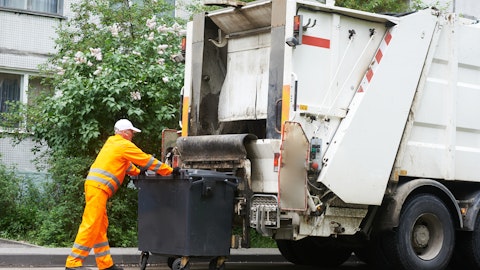Mark Duff: Yes, I mentioned the JRC. I think I summed through that part of the script, Aaron. But the JRC is the Italy contract that we’re counting on, or hopeful for, yes. I don’t know if that’s why I broke down or not. But the bottom line is we’re expecting to hear about the JRC bid any minute. And as I mentioned before, it’s nearly $50 million job. And it will be kind of the seed for our overall European strategy. But overall, to answer your question, we continue to get shipments from Germany. We’re working with one right now, we shipped any day from Croatia and Slovenia, as well as the UK and Italy. So the more we’re shipping, the better we’re getting at it, and more efficient we’re getting at it, to deal with all the logistics and all the paperwork that goes with shipping radioactive material across the Atlantic.
So it is going very well. The market is really exploding. And the marketing we’ve done has been very effective to the effect that we’re getting the opportunity to bid on a lot of things. And hopefully, we will see that JRC announcement soon, and then we will start moving forward with the new plant in England, which will kind of be the centerpiece of our European approach.
Aaron Warwick: Alright. Okay. So for Hanford, a couple of things. First of all, I was pleasantly surprised to hear well, at least if I understood it correctly, that even if you’re bidding conglomerate were to lose, and it sounds like there is only two. But even if you were to lose, that you still may get some business because of that small business clause as part of the contract, am I understanding that correct?
Mark Duff: Yes, that is speculation and I don’t know the landscape if we were to lose, who the winner is going to have on their team necessarily. So that’s really speculation. But yes, those will be opportunities for that. Again, it’s important to understand, as I’ve told investors, the ITDC is primarily labor and the waste will be separate. And the waste will €“ for example, DFLAW is part of that contract. To operate the DFLAW and the waste will come out separately as a separate subcontract and not through the ITDC to us. So, the opportunity to do the waste that’s defined in the ROD amendment which is slated to come our way, I won’t say it’s operational. And then there is other opportunities for other waste that we will likely get as well. And then there is other opportunities for labor that €“ and other small business opportunities along the way. So yes, to answer your question, there will be opportunities as a small business, most likely with the awarding.
Aaron Warwick: Yes. And you had mentioned up to $200 million. That was about my estimate as well, obviously, not necessarily every year, but on an annualized basis. And I’m just wondering that would go to small business. How many small businesses are there? There can’t be that many small businesses that are doing what you do. So I just…
Mark Duff: There is €“ none of our competitors are day-to-day competitors, which are WCS and energy solutions and those types of firms, which are private companies. None of those guys are small business. So you’re absolutely right. It was a very limited small business competition with waste treatment capability. There is a few. There is a couple here in Oak Ridge. There is really not any necessarily in the Hanford area to speak of at this point. But €“ it’s also very broad scope. There is other things to do. But as far as what we do, there is very limited small business competition in this space.
Aaron Warwick: Okay. Thank you. So speaking of the larger competitors, some of them were mentioned in the final WIR that for the TBI that you had talked about earlier. And I think it caught some people by surprise as you were the only one that was mentioned in the 1% secondary waste. But can you explain what the reasoning is behind that?


